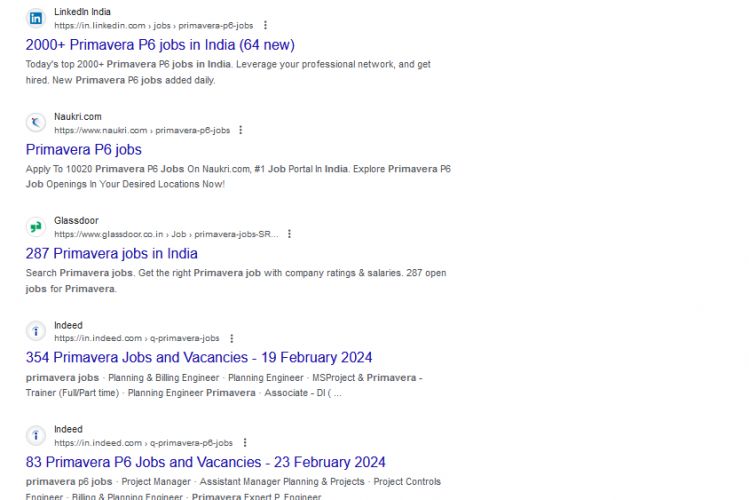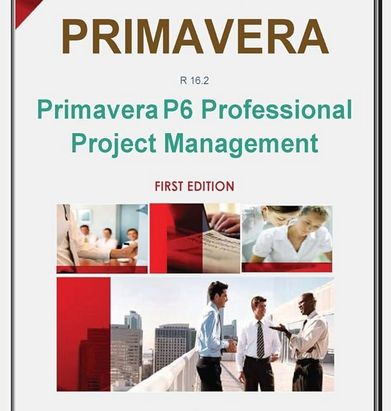Primavera Training by Experts
Our Training Process

Primavera - Syllabus, Fees & Duration
Here's a suggested syllabus for a Primavera course, progressing from basic to advanced concepts:
Basic Level:
-
Introduction to Project Management Software
- Overview of Primavera
- Importance of project management software in planning and scheduling
Getting Started with Primavera
- Installation and setup
- Interface overview
- Creating a new project
Creating Work Breakdown Structure (WBS)
- Understanding WBS
- Creating and organizing activities
- Assigning codes to activities
Adding Relationships and Constraints
- Dependency types (Finish-to-Start, Start-to-Start, Finish-to-Finish, Start-to-Finish)
- Adding relationships between activities
- Applying constraints to activities
Intermediate Level:
Scheduling Techniques
- Critical Path Method (CPM)
- Understanding float and total float
- Analyzing the critical path
Resource Management
- Adding and organizing resources
- Assigning resources to activities
- Resource leveling
Baseline and Tracking
- Creating baselines
- Tracking progress against baselines
- Updating schedules
Advanced Level:
Project Analysis and Reporting
- Generating reports (Gantt charts, resource usage, cash flow, etc.)
- Analyzing project performance
- Earned Value Management (EVM) techniques
Risk Management
- Identifying project risks
- Incorporating risk management into schedules
- Mitigation strategies
Advanced Features
- Global changes and filters
- Multiple project management
- Customizing layouts and views
Integration with Other Software
- Importing and exporting data
- Integration with Excel, Microsoft Project, etc.
Advanced Topics
- Portfolio management
- Multi-project analysis
- Advanced scheduling techniques (PERT analysis, Monte Carlo simulation)
Each module should include hands-on exercises and practical examples to reinforce learning. Additionally, regular assessments and quizzes can be incorporated to gauge understanding and progress throughout the course.
This syllabus is not final and can be customized as per needs/updates





 Through features such as progress tracking, performance measurement, and earned value analysis, project managers can evaluate project performance against baseline plans, identify deviations, and make timely corrections to keep the project on track. Below we will further explain the importance of learning primavera through some important aspects. Masu.
Efficient project planning and scheduling:
Primavera allows project managers to carefully plan and schedule every aspect of a project. Collaboration is enabled by allowing team members to share project data, update schedules, and communicate effectively within the platform, facilitating better coordination and coordination among project teams. Integrating risk management capabilities into project planning allows project managers to anticipate potential disruptions, develop contingency plans, and effectively mitigate risks, making projects more resilient.
Risk management and mitigation:
Every project has inherent risks that can affect its success.
Resource management and optimization:
One of the important aspects of project management is resource management. You can take action. can.
Through features such as progress tracking, performance measurement, and earned value analysis, project managers can evaluate project performance against baseline plans, identify deviations, and make timely corrections to keep the project on track. Below we will further explain the importance of learning primavera through some important aspects. Masu.
Efficient project planning and scheduling:
Primavera allows project managers to carefully plan and schedule every aspect of a project. Collaboration is enabled by allowing team members to share project data, update schedules, and communicate effectively within the platform, facilitating better coordination and coordination among project teams. Integrating risk management capabilities into project planning allows project managers to anticipate potential disruptions, develop contingency plans, and effectively mitigate risks, making projects more resilient.
Risk management and mitigation:
Every project has inherent risks that can affect its success.
Resource management and optimization:
One of the important aspects of project management is resource management. You can take action. can.



















































































